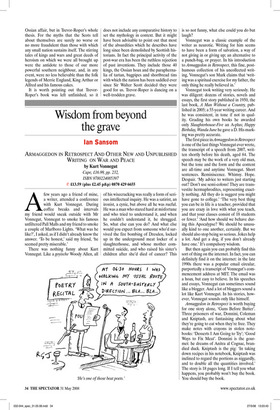Wisdom from beyond the grave
Ian Sansom
ARMAGGEDON IN RETROSPECT AND OTHER NEW AND UNPUBLISHED WRITING ON WAR AND PEACE by Kurt Vonnegut Cape, £16.99, pp. 232, ISBN 9780224085397 ✆ £13.59 (plus £2.45 p&p) 0870 429 6655 Afew years ago a friend of mine, a writer, attended a conference with Kurt Vonnegut. During coffee breaks and intervals my friend would sneak outside with Mr Vonnegut, Vonnegut to smoke his famous unfiltered Pall Malls and my friend to smoke a couple of Marlboro Lights. ‘What was he like?’, I asked, as if I didn’t already know the answer. ‘To be honest,’ said my friend, ‘he seemed pretty miserable.’ There was nothing funny about Kurt Vonnegut. Like a goyische Woody Allen, all of his wisecracking was really a form of serious intellectual inquiry. He was a satirist, an ironist, a cynic, but above all he was rueful. He was a man who stared hard at misfortune and who tried to understand it, and when he couldn’t understand it, he shrugged. So, what else can you do? And what else would you expect from someone who’d survived the fire bombing of Dresden, locked up in the underground meat locker of a slaughterhouse, and whose mother committed suicide, and who raised his sister’s children after she’d died of cancer? This is so not funny, what else could you do but laugh?
Vonnegut was a classic example of the writer as neurotic. Writing for him seems to have been a form of salvation, a way of not giving in or giving up; an alternative to a punch-bag, or prayer. In his introduction to Armaggedon in Retrospect, this fine, posthumous collection of his uncollected writing, Vonnegut’s son Mark claims that ‘writing was a spiritual exercise for my father, the only thing he really believed in.’ Vonnegut took writing very seriously. He was diligent: dozens of stories, novels and essays, the first story published in 1950, the last book, A Man Without a Country, published in 2005; a 55-year writing career. And he was consistent, in tone if not in quality. Grading his own books he awarded only Slaughterhouse-Five an A-plus; Happy Birthday, Wanda June he gave a D. His marking was pretty accurate.
The first piece in Armaggedon in Retrospect is one of the last things Vonnegut ever wrote, the transcript of a speech from 2007, written shortly before his death, aged 84. The speech may be the work of a very old man, but the tone and the form and the content are all-time and anytime Vonnegut. Short sentences. Reminiscence. Whimsy. Hope. Despair. ‘My advice to writers just starting out? Don’t use semi-colons! They are transvestite hermaphrodites, representing exactly nothing. All they do is suggest you might have gone to college.’ ‘The very best thing you can be in life is a teacher, provided that you are crazy in love with what you teach, and that your classes consist of 18 students or fewer.’ ‘And how should we behave during this Apocalypse? We should be unusually kind to one another, certainly. But we should also stop being so serious. Jokes help a lot. And get a dog, if you don’t already have one.’ It’s compulsory wisdom.
But then again you can probably find this sort of thing on the internet. In fact, you can definitely find it on the internet: in the late 1990s there was a popular email circular, purportedly a transcript of Vonnegut’s commencement address at MIT. The email was a hoax, but easy to believe. In his speeches and essays, Vonnegut can sometimes sound like a blogger. And a lot of bloggers sound a lot like Kurt Vonnegut. In his stories, however, Vonnegut sounds only like himself.
Armaggedon in Retrospect is worth buying for one story alone, ‘Guns Before Butter’. Three prisoners of war, Donnini, Coleman and Kniptash, are fantasising about what they’re going to eat when they’re free. They make notes with crayons in stolen notebooks: ‘Desserts I Am Going to Try’; ‘Good Ways to Fix Meat’. Donnini is the gourmet: he dreams of Anitra al Cognac, brandied duck. Kniptash is the pig: ‘In taking down recipes in his notebook, Kniptash was inclined to regard the portions as niggardly, and to double all the quantities involved.’ The story is 18 pages long. If I tell you what happens, you probably won’t buy the book. You should buy the book.










































































 Previous page
Previous page